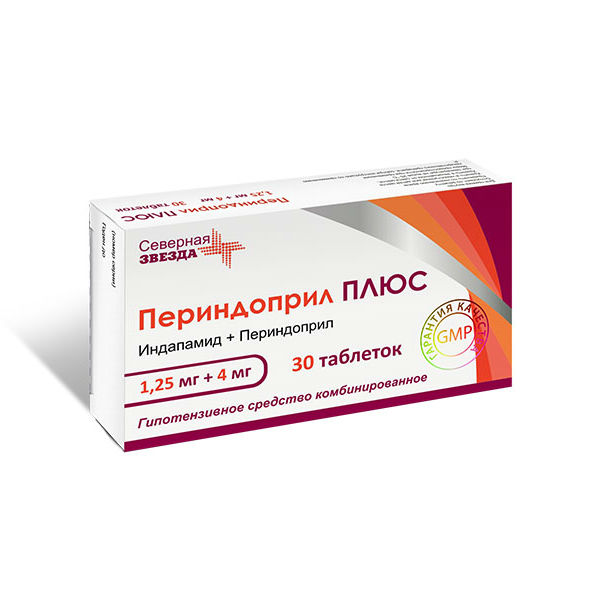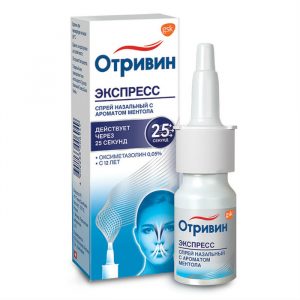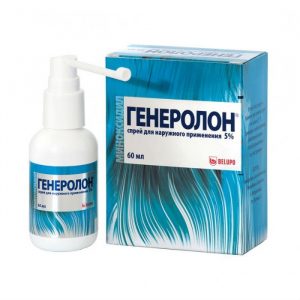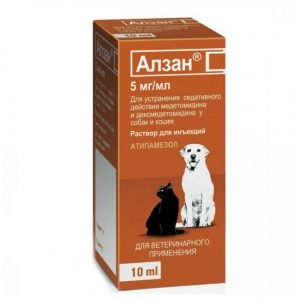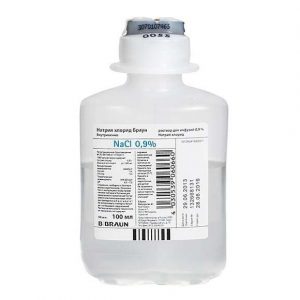Description
Pharmacological action
Drug Perindopril PLUS – a combination drug containing indapamide and perindopril erbumin. The pharmacological properties of the drug Perindopril PLUS combine the individual properties of each of its active components.
Mechanism of Action
Perindopril PLUS
The combination of indapamide and perindopril enhances the antihypertensive effect of each of them.
Perindopril
Perindopril is an inhibitor of the enzyme that converts angiotensin I to angiotensin II (an angiotensin converting enzyme (ACE) inhibitor). ACE, or kininase II, is an exopeptidase that carries out as a conversion of angiotensin I the vasoconstrictor substance angiotensin II, and the destruction of bradykinin, which has a vasodilating effect, to an inactive heptapeptide.
As a result of perindopril:
reduces the secretion of aldosterone
by the principle of negative feedback increases the activity of renin in blood plasma
with prolonged use reduces the total peripheral vascular resistance (OPSS), which is mainly due to the effect on blood vessels in muscles and kidneys. These effects are not accompanied by a delay in sodium and fluid ions or the development of reflex tachycardia.
Perindopril normalizes the myocardium, reducing preload and afterload.
When studying hemodynamic parameters in patients with chronic heart failure (CHF), the following were revealed:
decreased filling pressure in the left and right ventricles of the heart
decreased OPSS
increased cardiac output and increased cardiac index
increased muscular peripheral blood flow.
Indapamide
Indapamide belongs to the group of sulfonamides, with pharmacological properties similar to thiazide diuretics.
Indapamide inhibits the reabsorption of sodium ions in the cortical segment of the Henle loop, which leads to increased excretion of sodium, chlorine and, to a lesser extent, sodium and magnesium ions by the kidneys, thereby increasing diuresis and lowering blood pressure (BP).
Antihypertensive effect
Perindopril PLUS
The drug Perindopril PLUS has a dose-dependent antihypertensive effect on both diastolic and systolic blood pressure in both standing and lying down.
Antihypertensive effect persists for 24 hours. A stable therapeutic effect develops less than 1 month after the start of therapy and is not accompanied by tachyphylaxis. Discontinuation of treatment does not cause withdrawal syndrome.
The drug Perindopril PLUS reduces the degree of left ventricular hypertrophy (LVH), improves the elasticity of arteries, reduces OPSS, does not affect the metabolism of lipids (total cholesterol, cholesterol, high density lipoproteins (HDL) and low density lipoproteins (LDL), triglycerides).
The effect of the combination of perindopril and indapamide on LVH has been proven compared to enalapril. In patients with arterial hypertension and LVH, who received therapy with perindopril erbumin 2 mg / indapamide 0.625 mg or enalapril at a dose of 10 mg once a day, and with an increase in the dose of perindopril erbumin to 8 mg and indapamide to 2.5 mg, or enalapril to 40 mg once a day, a more significant decrease in the left ventricular mass index (LVMI) was observed in the perindopril / indapamide group compared with the enalapril group. In this case, the most significant effect on LVMI is observed with the use of perindopril erbumin 8 mg / indapamide 2.5 mg.
A more pronounced antihypertensive effect was also observed against the background of combination therapy with perindopril and indapamide compared to enalapril.
Perindopril
Perindopril is effective in the treatment of hypertension of any severity. The antihypertensive effect of the drug reaches a maximum 4-6 hours after a single oral administration and persists for 24 hours. 24 hours after taking the drug, there is a pronounced (about 80%) residual inhibition of ACE.
Perindopril has an antihypertensive effect in patients with both low and normal plasma renin activity. The simultaneous administration of thiazide diuretics enhances the severity of the antihypertensive effect. In addition, the combination of an ACE inhibitor and a thiazide diuretic also reduces the risk of hypokalemia while taking diuretics.
Double blockade of the renin-angiotensin-aldosterone system (RAAS)
There are clinical trials of combination therapy using an ACE inhibitor with angiotensin II receptor antagonists (ARA II).
Clinical studies have been conducted in patients with a history of cardiovascular or cerebrovascular disease, or type 2 diabetes, accompanied by confirmed damage to the target organ, as well as studies involving patients with type 2 diabetes and diabetic nephropathy.
These studies did not reveal a significant positive effect on the occurrence of renal and / or cardivascular events and mortality rates in patients receiving combination therapy, while the risk of hyperkalemia, acute renal failure and / or arterial hypotension increased compared to patients receiving monotherapy.
Taking into account the similar intragroup pharmacodynamic properties of ACE inhibitors and ARA II, these results can be expected for the interaction of any other drugs, representatives of the classes of ACE inhibitors and ARA II.
Therefore, the use of ACE inhibitors in combination with angiotensin II receptor antagonists in patients with diabetic nephropathy is contraindicated.
There is evidence from a clinical study examining the beneficial effects of adding aliskiren to standard therapy with an ACE inhibitor or an ARA II in patients with type 2 diabetes and chronic kidney disease or cardiovascular disease, or with a combination of these diseases.
The study was terminated early due to the increased risk of adverse outcomes. Cardiovascular death and stroke occurred more frequently in the group of patients receiving aliskiren compared with the placebo group. Also adverse events and serious adverse events of special interest (hyperkalemia, arterial hypotension and impaired renal function) were recorded more often in the aliskiren group than in the placebo group.
Indapamide
Antihypertensive effect occurs when the drug is used in doses that have minimal diuretic effect. The antihypertensive effect of indapamide is associated with an improvement in the elastic properties of large arteries and a decrease in OPSS.
Indapamide reduces LVH, does not affect the concentration of lipids in blood plasma: triglycerides, total cholesterol, LDL, HDL carbohydrate metabolism (including in patients with concomitant diabetes mellitus).
Indications
Essential hypertension.
Composition
1 tablet contains:
active ingredients:
indapamide – 1.25 mg,
perindopril erbumin – 4.0 mg
excipients: microcrystalline cellulose 102 – 70.75 mg croscarmellose sodium (primrose) 3 mg Pregelatinized corn starch (starch 1500) – 15.0 mg sodium bicarbonate – 4.0 mg magnesium stearate – 1, 0 mg of silicon dioxide anhydrous colloidal anhydrous (Aerosil anhydrous) – 1.0 mg.
Side effects
The frequency of side effects is estimated based on: often – 1-10% rarely – 0.1-1% extremely rare, including individual messages – less than 0.1%.
From the cardiovascular system: often – an excessive decrease in blood pressure and the associated symptoms, rarely – arrhythmia, angina pectoris, myocardial infarction and stroke.
From the urinary system: decreased renal function, acute renal failure.
On the part of the respiratory system: often – dry cough, difficulty breathing rarely – bronchospasm, rhinorrhea.
From the digestive system: often – nausea, vomiting, abdominal pain, taste change, diarrhea or constipation, dry mouth, decreased appetite, cholestatic jaundice, pancreatitis, intestinal edema.
From the central nervous system: often – headache, asthenia, fatigue, dizziness, ringing in the ears, visual impairment, muscle cramps, paresthesias rarely – decreased mood, insomnia extremely rare – confusion.
Allergic reactions: often – skin rash, itching rarely – urticaria, angioedema extremely rare – erythema multiforme exudative.
Laboratory indicators: often – hypercreatininemia, proteinuria, hyperkalemia, hyperuricemia rarely (with prolonged use at high doses) – neutropenia, leukopenia, hypogemoglobinemia, thrombocytopenia, extremely low hematocrit – agranulocytosis, pancytopenia, hepatic hemorrhagea, increased liver activity background deficiency of glucose-6-phosphate dehydrogenase).
Other: increased sweating, impaired sexual function.
Overdose
Symptoms: marked decrease in blood pressure, nausea, vomiting, muscle cramps, dizziness, drowsiness, confusion, oliguria up to anuria (due to a decrease in BCC), disturbances in the water-electrolyte balance are possible (low content of sodium and potassium in the blood plasma).
Treatment: gastric lavage and / or administration of activated carbon, restoration of water-electrolyte balance in a hospital. With a marked decrease in blood pressure, it is necessary to transfer the patient to supine position with legs raised up, then measures should be taken to increase the BCC (administration of a 0.9% solution of sodium chloride intravenously). Perindoprilat, an active metabolite of perindopril, can be excreted by dialysis.
Active ingredient
Indapamide, Perindopril
lekarstvennaja form
tablets
